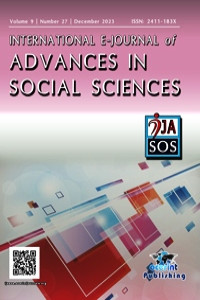Öz
Kaynakça
- 'Abu Eaytata, (2001). Aljaza'at Aldawliat Bayn Alnazariat Waltatbiqi, Muasasat Althaqafat Aljamieiati, Aliaskandiriatu, Masr.
- Alsaqli, 'Ii. Y. (2014). Alhazr Alduwliu Fi Alqanun Alduwlii Aleami, Dirasat Qanuniatun, Dar Alfikr Aljamieii, Al'iiskandiriati.
- Alhusayni, Zi. (1998). Altadabir Almudadat Fi Alqanun Alduwalii Aleama, Dar Alkutub Alwataniati, Manshurat Jamieat Qaryuns, Binghazi, Altabeat Althaaniatu.
- Shari, Kha. Ma. (2017). Maswuwliat Aldawlat Ean Al'adrar 'Athna' Alnizaeat Almusalahati, Dar Alkutub Alqanuniati, Alqahirati.
- Hanz Kalsan, (1986). Alnazariat Almahdat Fi Alqanuni, Tarjamat 'Akram Alwtri, Markaz Al'abhath Alqanuniat Fi Wizarat Aleadli, Aleiraqi, Baghdad.
- Alghanimi, Mu. Tu. (2011). Alqanun Alduwliu Aleamu, Dar Almatbueat Aljamieiati, Al'iiskandariati.
- Wadie T. (1991). Alhisar Aliaqtisadiu, Almuasasat Alhadithat Lilkitabi, Lubnan.
- Bijak, Ba. Y. (2011). Madaa Mashrueiat Aleuqubat Alamarikiat Wal'uwrubiyat Ealaa Suriat Fi Daw' Alqanun Alduwali, Majalat Almustaqbal Alearabii, Aleadad 393.
- Alnueaymi, Ei. Ea.Ha. (2017). Alhazr Alainfiradiu Min Manzur Alqanun Alduwalii Aleami, Jamieat Tikrit, Majalat Kuliyat Alqanun Lileulum Alqanuniat Walsiyasiati.
- Muhamad Ramadan, (2023). Altadabir Alqasriat Aliainfiradiat Fi Daw' Mabadi Wa'ahkam Alqanun Alduwalii Aleami, Almajalat Alqanuniati. Majalat Mutakhasisatan Fi Aldirasat Walbuhuth Alqanuniata, S S 530- 714.
- Alkinji, 'A. (2018). Mashrueiat Altadabir Alqasriat Alanfradyt Al'amrikiati- Alawrubiyati, Risalat Muqadimat Linayl Darajat Almajistir Fi Alqanun Alduwali, Jamieat Dimashqa, Kuliyat Alhuquqi.
- Salah Aldiyn, Hu. (2015). 'Athar Aldiblumasiat Alaiqtisadiat Fi Altanmiat Alaiqtisadia "Suriat 'Unmudhaju", Risalat 'Ueidat Linayl Darajat Aldukturahi, Jamieat Dimashqa, Kuliyat Alaiqtisadi.
- Al'ansari, Ma. Ea. (2018). Madaa Mashrueiat Alluju' 'Iilaa Altadabir Walturuq Alqasriat Fi Alqanun Alduwali, Risalat Aeddt Linayl Darajat Almajistir Fi Alqanun Aleami, Jamieat Qutr, Kuliyat Alqanuni.
- Alshiymi, Y. Ea. (1976). Mabda Tahrim Alhurub Fi Alealaqat Alduwaliati, Risalatan Muqadimatan Linayl Darajat Aldukturah Fi Aleulum Alsiyasiat Min Jamieat Alqahirati, Dar Alnahdat Alearabiati.
- Alhawish, Y. Kha. (2001). Mabda Eadam Altadakhul Waitifaqiaat Tahrir Altijarat Alealamiati, Risalat 'Ueidat Linayl Darajat Aldukturahi, Kuliyat Alhuquqi, Jamieat Eayn Shams.
- Muhamadu, Mi. Y. (1985). Alnazariat Aleamat Lieadam Altadakhul Fi Shuuwn Alduwali, Dirasat Fiqhiat Watatbiqiat Fi Daw' Mabadi Alqanun Alduwalii Almueasiri, Kuliyat Alhuquqi, Jamieat Alqahira
Öz
DOI: https://doi.org/10.5281/zenodo.10459624
Abstract
This descriptive and analytical study discussed the coercive measures of some states and their impact on human rights. The problem is; In the methods of powerful countries to impose their influence in their relations with other countries using force, under the pretext of resolving international disputes, applying the principle of peacefulness, when they were certain that the means stipulated internationally; It will not lead to any results. Therefore, the study aimed to: discuss the legal procedures and the legal basis of legitimacy on which the imposing state relies. Distinction between similar terms imposed within the United Nations. Research into the effects of these measures and their repercussions on the state and their impact on human rights. By adopting the descriptive analytical approach, the study reached the following results: These coercive measures directly violate the Charter of the United Nations. These measures lack legitimacy because they were not issued with UN approval and are therefore considered a violation of the state’s sovereignty and interference in its internal affairs. The concept of coercive measures overlaps and mixes with other concepts. Therefore, it must be noted that there is an international agreement to present the concept of unilateral coercive measures in order to understand their seriousness and effects. Because these measures have a devastating impact on basic human rights, and on the economic, social and cultural reality of the countries on which sanctions are imposed.
Anahtar Kelimeler
Kaynakça
- 'Abu Eaytata, (2001). Aljaza'at Aldawliat Bayn Alnazariat Waltatbiqi, Muasasat Althaqafat Aljamieiati, Aliaskandiriatu, Masr.
- Alsaqli, 'Ii. Y. (2014). Alhazr Alduwliu Fi Alqanun Alduwlii Aleami, Dirasat Qanuniatun, Dar Alfikr Aljamieii, Al'iiskandiriati.
- Alhusayni, Zi. (1998). Altadabir Almudadat Fi Alqanun Alduwalii Aleama, Dar Alkutub Alwataniati, Manshurat Jamieat Qaryuns, Binghazi, Altabeat Althaaniatu.
- Shari, Kha. Ma. (2017). Maswuwliat Aldawlat Ean Al'adrar 'Athna' Alnizaeat Almusalahati, Dar Alkutub Alqanuniati, Alqahirati.
- Hanz Kalsan, (1986). Alnazariat Almahdat Fi Alqanuni, Tarjamat 'Akram Alwtri, Markaz Al'abhath Alqanuniat Fi Wizarat Aleadli, Aleiraqi, Baghdad.
- Alghanimi, Mu. Tu. (2011). Alqanun Alduwliu Aleamu, Dar Almatbueat Aljamieiati, Al'iiskandariati.
- Wadie T. (1991). Alhisar Aliaqtisadiu, Almuasasat Alhadithat Lilkitabi, Lubnan.
- Bijak, Ba. Y. (2011). Madaa Mashrueiat Aleuqubat Alamarikiat Wal'uwrubiyat Ealaa Suriat Fi Daw' Alqanun Alduwali, Majalat Almustaqbal Alearabii, Aleadad 393.
- Alnueaymi, Ei. Ea.Ha. (2017). Alhazr Alainfiradiu Min Manzur Alqanun Alduwalii Aleami, Jamieat Tikrit, Majalat Kuliyat Alqanun Lileulum Alqanuniat Walsiyasiati.
- Muhamad Ramadan, (2023). Altadabir Alqasriat Aliainfiradiat Fi Daw' Mabadi Wa'ahkam Alqanun Alduwalii Aleami, Almajalat Alqanuniati. Majalat Mutakhasisatan Fi Aldirasat Walbuhuth Alqanuniata, S S 530- 714.
- Alkinji, 'A. (2018). Mashrueiat Altadabir Alqasriat Alanfradyt Al'amrikiati- Alawrubiyati, Risalat Muqadimat Linayl Darajat Almajistir Fi Alqanun Alduwali, Jamieat Dimashqa, Kuliyat Alhuquqi.
- Salah Aldiyn, Hu. (2015). 'Athar Aldiblumasiat Alaiqtisadiat Fi Altanmiat Alaiqtisadia "Suriat 'Unmudhaju", Risalat 'Ueidat Linayl Darajat Aldukturahi, Jamieat Dimashqa, Kuliyat Alaiqtisadi.
- Al'ansari, Ma. Ea. (2018). Madaa Mashrueiat Alluju' 'Iilaa Altadabir Walturuq Alqasriat Fi Alqanun Alduwali, Risalat Aeddt Linayl Darajat Almajistir Fi Alqanun Aleami, Jamieat Qutr, Kuliyat Alqanuni.
- Alshiymi, Y. Ea. (1976). Mabda Tahrim Alhurub Fi Alealaqat Alduwaliati, Risalatan Muqadimatan Linayl Darajat Aldukturah Fi Aleulum Alsiyasiat Min Jamieat Alqahirati, Dar Alnahdat Alearabiati.
- Alhawish, Y. Kha. (2001). Mabda Eadam Altadakhul Waitifaqiaat Tahrir Altijarat Alealamiati, Risalat 'Ueidat Linayl Darajat Aldukturahi, Kuliyat Alhuquqi, Jamieat Eayn Shams.
- Muhamadu, Mi. Y. (1985). Alnazariat Aleamat Lieadam Altadakhul Fi Shuuwn Alduwali, Dirasat Fiqhiat Watatbiqiat Fi Daw' Mabadi Alqanun Alduwalii Almueasiri, Kuliyat Alhuquqi, Jamieat Alqahira
Ayrıntılar
| Birincil Dil | İngilizce |
|---|---|
| Konular | Hukuk Sosyolojisi |
| Bölüm | Makaleler |
| Yazarlar | |
| Erken Görünüm Tarihi | 4 Ocak 2024 |
| Yayımlanma Tarihi | 29 Aralık 2023 |
| Gönderilme Tarihi | 29 Ekim 2023 |
| Kabul Tarihi | 24 Kasım 2023 |
| Yayımlandığı Sayı | Yıl 2023 Cilt: 9 Sayı: 27 - Issue 27, December 2023 |
Contact: ijasosjournal@hotmail.com
The IJASOS Journal's site and its metadata are licensed under CC BY
Published and Sponsored by OCERINT International © 2015- 2025


